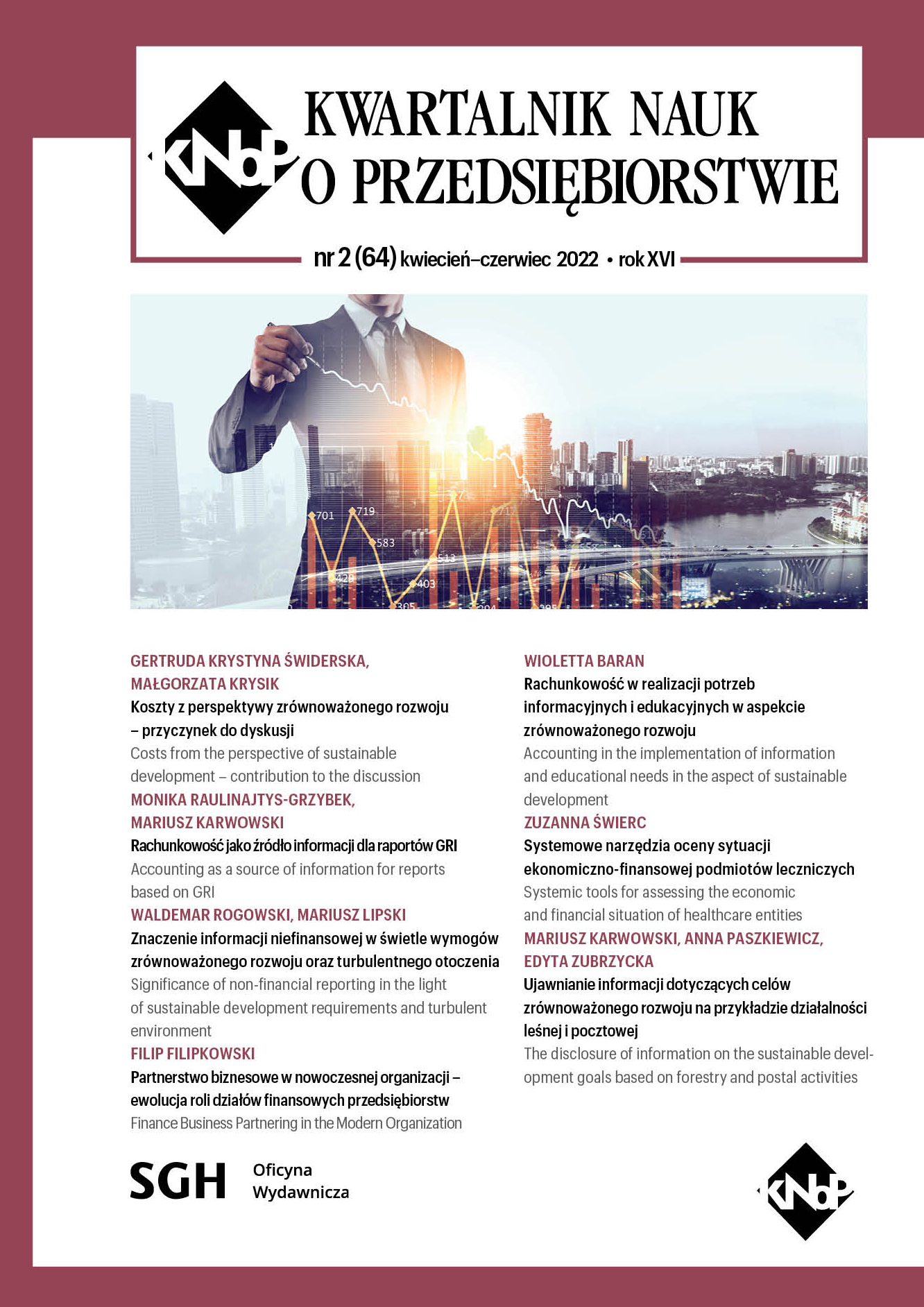Significance of non-financial reporting in the light of sustainable development requirements and turbulent environment
Main Article Content
Abstract
While the significance of sustainable development and its results is increasing, also the role of companies’ non-financial reporting is getting more and more important. Taking into account social, environmental and corporate aspects within economic calculation is becoming crucial too. The aim of the paper is to present results of analysis regarding the scope, role and significance of companies’ non-financial reporting influenced by changes in their environment. The article presents the thesis: in the light of an increase of sustainable development idea and turbulences in the economy caused by exogenous issues (pandemic and the war in Ukraine), non-financial aspects are becoming more and more important part in evaluation of company’s financial standing, risk of further activity and the outlook. After the analysis, it turned out that the thesis was confirmed. Evaluation of company’s standing and its outlook only on the basis of financial reports can led to false conclusions and false investment decisions due to lack of possibility to complex assessment.
Downloads
Article Details
The author of the article declares that the submitted article does not infringe the copyrights of third parties. The author agrees to subject the article to the review procedure and to make editorial changes. The author transfers, free of charge, to SGH Publishing House the author's economic rights to the work in the fields of exploitation listed in the Article 50 of the Act of 4 February 1994 on Copyright and Related Rights – provided that the work has been accepted for publication and published.
SGH Publishing House holds economic copyrights to all content of the journal. Placing the text of the article in a repository, on the author's home page or on any other page is allowed as long as it does not involve obtaining economic benefits, and the text will be provided with source information (including the title, year, number and internet address of the journal).
References
Morrison R. (2021), Environmental, Social and Governance Theory: Defusing a Major Threat to Shareholder Rights, Competitive Enterprise Institute, Washington.
Parlament Europejski (2014), Dyrektywa Parlamentu Europejskiego i Rady 2014/95/UE z dnia 22 października 2014 r. zmieniająca Dyrektywę 2013/34/UE w odniesieniu do ujawniania informacji niefinansowych i informacji dotyczących różnorodności przez niektóre duże jednostki oraz grupy, https://eur-lex.europa.eu/legal-content/PL/TXT/?uri=CELEX%3A32014L0095 (dostęp: 15.03.2022).
Parlament Europejski (2019), Rozporządzenie Parlamentu Europejskiego i Rady (UE) 2019/2088 z dnia 27 listopada 2019 r. w sprawie ujawniania informacji związanych ze zrównoważonym rozwojem w sektorze usług finansowych, https://eur-lex.europa.eu/legal-content/PL/TXT/?uri=CELEX%3A32019R2088 (dostęp: 25.03.2022).
PwC (2021), ESG – miecz Damoklesa czy szansa na strategiczną zmianę?, https://www.pwc.pl/pl/pdf-nf/2021/ESG_Miecz_Damoklesa_raport_PwC_2021.pdf (dostęp: 26.03.2022).
PwC (2022), Zielone finanse po polsku – jak ESG zmieni sektor bankowy i finansowanie firm?, https://www.pwc.pl/pl/publikacje/zielone-finanse-po-polsku-jak-esg-zmieni-sektor-bankowyi-finansowanie-firm.html (dostęp: 27.03.2022).
Rogowski W., Ulianiuk A. (2012), Społecznie odpowiedzialne inwestowanie (SRI) – próba charakterystyki, cz. II: Rynek społecznie odpowiedzialnych inwestycji (SRI), „Zeszyty Naukowe Kolegium Zarządzania i Finansów”, 113, 154–182.
Stolowy H., Paugam L. (2018), The expansion of non-financial reporting: an exploratory study, “Accounting and Business Research”, https://doi.org/10.1080/00014788.2018.1470141 (dostęp:12.05.2022).
United Nations (2015), Transforming our world: the 2030 Agenda for Sustainable Development, https://unstats.un.org/sdgs/indicators/database/ (dostęp: 21.03.2022).
The Global Compact (2004), Who Cares Wins: Connecting Financial Markets to a Changing World, https://www.unepfi.org/fileadmin/events/2004/stocks/who_cares_wins_global_compact_2004.pdf (dostęp: 23.03.2022).
World Commission on Environment and Development (1987), Our common future, https://sustainabledevelopment.un.org/content/documents/5987our-common-future.pdf (dostęp:27.03.2022).

